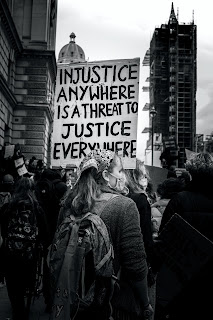Day 42 – Living in the muck
Day 42 - I read a chapter today that made my heart sing!!!! First of all, it was written in a very creative way… as an email exchange between two friends. And secondly, it examined with very little psychobabble, a re-examination of the person-centered approach to therapy.
Julie Webb’s (2018) chapter Therapy as an accident waiting to happen in the text, Revisioning Person-Centered Therapy: Theory and Practice of a Radical Paradigm edited by Manu Bazzano, is delightful! I particularly like the radical resistance in Webb’s advocacy for unknowing and allowing the client to be the absolute authority on their own lives and experience. In speaking about the unconscious or what she proposes would be described as the “actualizing tendency” by person-centered therapists:
I wait for it to reveal itself and its meaning for the client, not me. I mean, how could I possibly know someone else’s unconscious process when I cannot know my own – that is why we call it unconscious isn’t it?! (p.4)
Webb goes on to describe person-centered therapy (PCT) theory this way:
I do work with a theory of sorts; a person-centred (PC) theory, but I feel it is more to do with concepts, backdrops, and attitudes than anything written in stone as a method or formula – despite how it is often so reductively taught. Concepts, backdrops and attitudes are a bit of a problem in the current culture of evaluation, statistics, and having to show at every breath I take that my breathing is of benefit to the client and by extension the organization’s feel-good stats and targets.
I love this… I think these “concepts, backdrops, and attitudes” are like those held by expressive arts, and the way an expressive arts therapist works. It’s not that we know nothing, but rather that we keep our knowing focused on attempting “be ourselves” and to open ourselves up to understanding and caring about (my words) our experience and our client’s experience. Instead of focusing on “knowing,” Webb focuses on “openness.”
I think though, it is more about my aspiration for an unconditional openness towards the client (and myself), than my knowing anything. (p.5)
Webb proposes what she calls “a radical ethics:”
It is my job to meet the client empathically (you know, can I put myself in the client’s shoes? Of course, not fully or else I would lose sight of myself – though sometimes it might be advantageous for me to lose sight of me for a while); an attitude of non-judgement, an attempt to not judge the person adversely (though apparently it is OK for me to prize and encourage autonomy, how I do that without judging is beyond me); it is helpful apparently if I can be myself and not pretend to be an expert about the client’s life or predicament (this is sometimes challenging as all too often I do not know myself – how can I possibly?).
There is something here too about embracing the “otherness” within ourselves and within the other person that I think is important. The idea of separate but together.
I also really like this description:
As for aiming to be myself but not always knowing myself, that is really about being willing to be open to the surprise. I mean, I might find in the moment that I have prejudices I didn’t know I had, new feelings about past situations I thought had been dealt with, desires I didn’t know were there. In fact, come to think of it, I sincerely hope that the truth is I can never know myself, otherwise I have no surprises left in life, and what a tragedy that would be. Thinking I really, really, know myself upfront in all my glory is likely to come crashing down in disappointing horror – and it has done so many times. Every person and situation that I encounter in life is going to bring up feelings that I didn’t know I had, and that has to be wonderful!
I think what I like about this is that there is a certain “aliveness” in this idea of never really knowing ourselves. There is a certain “becoming” that is part of the person-centered approach that I need.
I could keep going, but I think this is enough for now… one last thing. In the next chapter The psychotherapeutic encounter as a political act of micro multitude by Claudio Rud, Rud quotes Carl Rogers –
As Gertrude Stein said of Paris, ‘It is not what Paris gives you; it is what she does not take away’. This can be paraphrased to become a definition of the person-centered approach, the value-laden concept [that is] central [here]: ‘It is not that this approach gives power to the person; it never takes it away’.
What a stark contrast from the medical model that offers “cure,” and holds knowledge in the hands of the expert “doctor.”




Comments